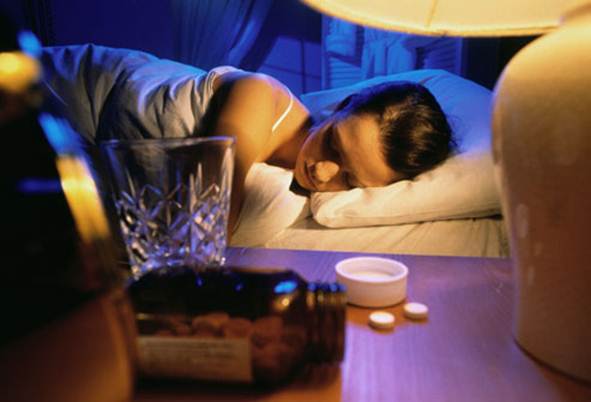Despite collapsing, I didn’t get the
specialist help that I so obviously needed. Over the next couple of years, I
continued to supplement the odd prescriptions with ‘Velium’ I’d bought in
Cambodia and Xanax from Egypt. I never went as far as buying anything online,
but only because I didn’t trust the websites offering them. I rarely confided
to friends but the latest figures show that sleeping pills are far from taboo.
About ten million prescriptions are written each year in the UK, which doesn’t
take into account those self-medicating like me.

After
moving to new-generation Z-drugs, such as zopiclone and zolpidem, which are
reportedly associated with less dependency, I was finding that nothing put me
to sleep
Last summer, I realized I had built up a
tolerance. After moving to new-generation Z-drugs, such as zopiclone and
zolpidem, which are reportedly associated with less dependency, I was finding
that nothing put me to sleep for long enough to counteract the hangover-style
side effects. These left me feeling like a space cadet the next day. I knew I
had to deal with my sleep problems as I was dangerously resorting to taking
more than one dose, or combining two different types of drug, to knock myself
out before bed. I was tired all the time, whether I was taking the pills or
not, and it had to stop. I made an appointment to see a new doctor at the
surgery and burst into tears as soon as I walked in, begging him to help me. He
was frank, warning me it would be an uphill battle to get treatment. Though an
estimated ten percent of the British population suffers from chronic insomnia,
there is little treatment available on the NHS. There are a limited number of
government-funded clinics, and most won’t take those with insomnia, focusing on
treating illness such as sleep apnoea or narcolepsy instead. He fought for a
referral and I tried to cut back on the pills.
And so, earlier this year, I finally found
myself sitting at the Insomnia Clinic at The Royal London Hospital for
Integrated Medicine. It was a relief to at last sit down with a doctor who took
a detailed history of my sleeping problems, which was followed a few weeks
later by an appointment with the lead psychiatrist, Dr Hugh Selsick. I felt
feeling, for the first time, that someone could really help.
Dr Selsick often sees patients like me who
have developed what he terms “maladaptive” behaviour to cope with insomnia, and
he believes that these habits can be changed. “We adapt to a lack of sleep
physiologically, psychologically and behaviourally,” says Dr Selsick.
“Unfortunately, quite often the thing you do to adapt to an acute lack of sleep
is what ends up perpetuating it in the long-term. The good news is this can be
effectively tackled and often resolved with cognitive behavioural therapy
[CBT].” CBT is a form of psychological therapy that aims to help people focus
on current problems rather than on past traumas, as most other forms of therapy
do.
As I write, I’m waiting my first CBT
session (I have been told six months is the average waiting time). I am feeling
optimistic, especially with my newfound willpower from reading those horrific
headlines. But I’m not there yet – and I still haven’t found the courage to
flush those Egyptian pills down the loo. When that day comes, I’ll know that I
have kicked my habit for good.
The sleep fixers
If you find yourself relying on sleeping
pills night after night, it may be time to seek help. Here’s how:
Insist your GP researches further help for
you, and be honest about your pill dependency. “Cognitive behavioural therapy
is effective at helping people come off medication, but it’s not always offered
on the NHS,” says Dr Selsick. “If you can afford to go private, do your
homework first. There are lots of people who claim to treat insomnia at a cost,
but ask for the research evidence that backs up what they are offering you.”
The London Sleep Centre – both run clinical trials and accept NHS as well as
private patients.

If
you find yourself relying on sleeping pills night after night, it may be time
to seek help
Speak to the HR occupational health
department at your workplace as some private clinics will take referrals from
private health provides and employers.
While you wait to join a recovery
programme, return regularly to your GP for monitoring while you slowly wean
yourself off the pills.
Visit mind.org.uk for advice on how to
improve your sleeping conditions and recognize what triggers your insomnia.
The GP’s opinion

The
initial treatment for insomnia remains lifestyle changes, such as stopping
drinking caffeinated drinks in the late afternoon and evening, taking plenty of
exercise and trying relaxation techniques and meditation before bed
Shocked by how let down Joanne felt, we
wanted to find out more. Dr Chris Chubb, a partner GP at The Milton Surgery n
Bristol, tells us about the current treatments for insomnia: “Sadly, Joanne’s
struggle is all too common – about 20 percent of the UK population experience
some sleeping difficulties. The initial treatment for insomnia remains
lifestyle changes, such as stopping drinking caffeinated drinks in the late
afternoon and evening, taking plenty of exercise and trying relaxation
techniques and meditation before bed. As Joanne mentioned, therapies such as
cognitive behavioural therapy may be helpful, but these aren’t always available
on the NHS. Unfortunately, sleeping pills often cause more problems than they
solve. People can quickly become dependent and, after some time, they may stop
working, as people become tolerant to them. I’m sure a lot of patients get
frustrated that their GPs aren’t referring them to a specialist. Sadly
specialist insomnia services are non-existent in the area where I practise, for
instance. Perhaps this is something that needs to be addressed.”